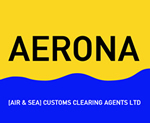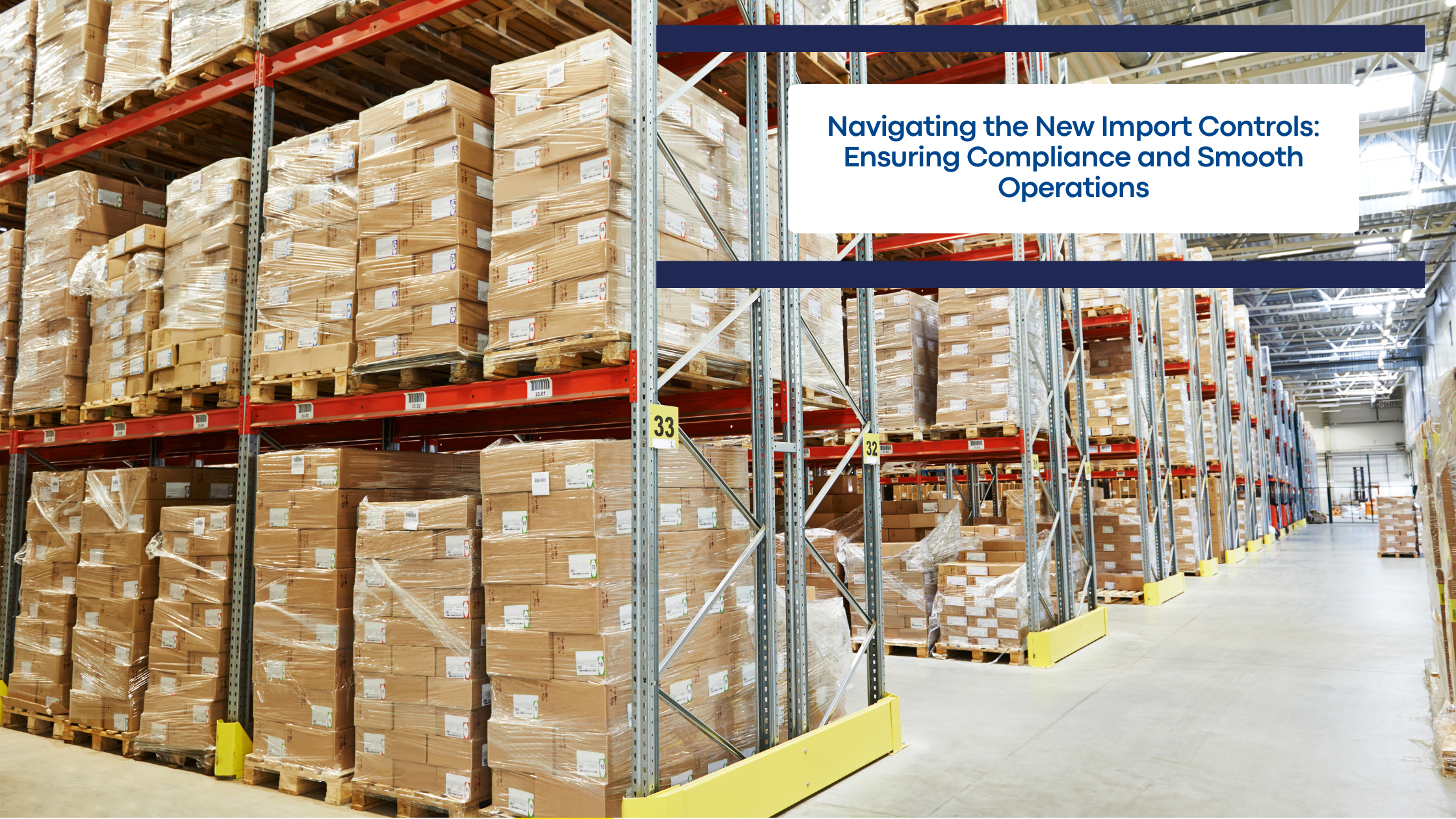Tel: 0161 652 3443 | Email: sales@aeronacca.co.uk
Navigating the New Import Controls: Ensuring Compliance and Smooth Operations
As we approach the 30th of April, 2024, it’s imperative for businesses engaged in importation to prepare for additional import controls. These measures, aimed at enhancing safety standards and regulatory compliance, necessitate proactive steps to avoid disruptions to your business and supply chain. Aerona Customs Clearing Agents, in collaboration with relevant authorities, are committed to assisting you in understanding and adhering to these changes effectively.
Recap of January 31, 2024, Changes
On the 31st of January 2024, significant alterations to import regulations were implemented. These changes included:
Introduction of health certification requirements for medium-risk :
animal products,
plants, and
plant products imported from the EU/EFTA.
Implementation of health certification for high-risk food and feed of non-animal origin from the EU/EFTA.
Introduction of import notifications for EU/EFTA products from the island of Ireland to Great Britain.
Adoption of the Common Health Entry Document (CHED) import notification for relevant imports into GB via the EU/EFTA.
Steps to Ensure Compliance with Current Regulations
To comply with the existing regulations, follow these steps:
Familiarize yourself with common errors identified since January 31.
General Errors:
Common Error: Low risk consignments with no accompanying commercial documents
Guidance: Low BTOM risk category consignments must come with relevant commercial documents from the supplier.
You do not need to provide a health certificate.
Low risk consignments will not be subject to routine documentary, identity and physical checks. However, from 30 April 2024 checks may still be undertaken where intelligence indicates a specific risk.
Guidance on what a commercial document accompanying a low risk should contain is available here for animal products for human consumption.
Common Error: Composites being incorrectly categorised
Guidance: Goods are being incorrectly identified as composite products, and therefore classified as low risk when this is not the case. Ensure your exporter has confirmed that product is a composite following the process set out.
Common Error: Multiple health certificates attached to a single pre-notification.
Guidance: Generally, each health certificate should be attached to a single import notification. This means a mixed load containing multiple medium risk goods should have multiple import notifications.
‘Compound’ products (a single product containing medium risk POAO which does not meet the definition of a composite) would be treated differently. Further guidance on ‘compound’ products is forthcoming.
Import notification Errors
EU address being provided for the operator responsible for the consignment instead of a UK address.
Guidance: This should contain the name and address of the person in the UK in charge of the consignment. This person makes the declarations to the competent authorities either as the importer or on behalf of the importer.
Common Error: Not completing the establishment field in the CHED
Guidance: The establishment of origin should be included the import notification.
Common Error: IUU documents are being uploaded to IPAFFS when they should be notifying the entry BCP directly.
Guidance: As per the Gov.uk guidance it currently remains a requirement to send IUU notifications direct to PHAs.
From April 30th the process will change, and the importer should attach the IUU notification to the IPAFFs notification. Importing or moving fish to Great Britain from 30 April 2024
To import or move fish to Great Britain from 30 April, you will need to:
continue to follow existing import requirements.
upload your IUU documents (if applicable) to IPAFFS (instead of providing them to the port health authority)
input required information from your IUU documents into IPAFFS.
ensure your goods enter Great Britain through a point of entry with a border control post (BCP) that is designated to check your commodity
If a port health authority identifies a problem with your documentation, they will be able to carry out physical checks for both IUU and SPS purposes.
This will apply for all consignments, including those in the low-risk category.
Export Health Certificate Errors
Common Error: Attestation incorrectly deleted.
Guidance: Check attestations are completed in accordance with the model certificate ‘notes for completion’ and all non-applicable attestations are correctly deleted or omitted from the certificate.
Deletions carried out by hand must be initialled and stamped.
If completed electronically as a verifiable PDF the signature and stamp per page is sufficient.
Common Error: Incorrect model certificate provided.
Guidance: Competent authorities in EU countries must provide a health certificate to exporters of animals and animal products to Great Britain (England, Scotland and Wales), the Channel Islands and the Isle of Man.
The model health certificates cover all of the import requirements for animals and animal products in Great Britain, the Channel Islands and the Isle of Man.
You must not directly copy the model health certificates provided on GOV.UK. Competent authorities should create their own official documents for use by exporters. These should include all the information from the model certificates. Certain consignments have been imported using certificates bearing the ‘model certificate only’ watermark that have been downloaded from Gov.uk.
If your product is medium risk and no EHC is provided for it on Gov.uk, you may need an import license or authorisation. More detail is available on Gov.uk
If your product is medium risk and an EHC is provided for it on Gov.uk but you are unable to obtain an EHC from an EU competent authority, you should contact imports@APHA.gov.uk
Common Error: Signature errors
Guidance: If a paper certificate is used it must bear the signature and stamp of the certifying officer.
Verifiable PDF certificates must bear a valid digital signature.
Common Error: Pages not numbered or numbered incorrectly
Guidance: All pages of the certificate must be sequentially numbered.
Common Error: No regionalisation code provided
Guidance: If a product is subject to regionalisation measures, you must include the correct regionalisation code as selected from the list on Gov.uk
Refer to the Frequently Asked Questions (FAQs) regarding IPAFFS and Health Certificates.
Q: An approved establishment is listed in TRACES NT but is not visible/selectable in IPAFFS
A: The EU list of approved establishments of origin (available to select in IPAFFS) is supplied by the EU’s TRACES NT system. The list supplied by TRACES NT is refreshed regularly in IPAFFS (and we will investigate any cases where an establishment does not appear to have been pulled from TRACES NT and loaded into IPAFFS correctly).
If you are not able to find your approved establishment in IPAFFS in
the first instance, please:
Confirm that the establishment has been listed by the relevant competent authority in TRACES NT.
Check that all search filters are cleared in IPAFFS and retry your search.
If your approved establishment is listed in TRACES NT but is still not visible in IPAFFS, then as a short-term workaround you can select the establishment titled ‘Not Found’ (under the ‘Country’ drop-down list) until it is added which will allow you to submit your CHED notification. To note, the ‘not found’ option is at the bottom of the ‘Country’ drop-down list displayed. It can be selected either by scrolling to the bottom of the drop-down list or by typing ‘not found’ in the ‘Country’ field.
Q: Is it possible to amend a CHED.P once submitted?
A: Currently you can amend your CHED.P notification at any point prior to it moving to a ‘Valid’ status in IPAFFS. It is not possible to provide a precise time at which this will happen. Until 30 April if you need to amend your notification, but it has already moved to a ‘Valid’ status in IPAFFS, there will be no need for you to submit a replacement pre-notification and your goods will not be held for checks at the border.
Q: Can I ask Defra to cancel my CHED.P notification?
A: We are not able to cancel your CHED.P notification once it has moved to a ‘Valid’ status in IPAFFS. Until 30 April if you need to amend your notification, but it has already moved to a ‘Valid’ status in IPAFFS, there will be no need for you to submit a replacement pre-notification and your goods will not be held for checks at the border.
Q: I don’t know the transport/vehicle details at the point of submitting my notification
A: Transport details should be provided at least one working day ahead of the consignment’s arrival in GB (i.e., at the point the CHED.P pre-notification needs to be submitted in IPAFFS). For example, if a
road vehicle was travelling by ferry, you would enter the reference number of the bill of lading or sea waybill as well the CMR note (if applicable). Until 30 April you can add this information after the CHED.P has been submitted in IPAFFS, at any point up until the status of the notification in IPAFFS changes to ‘Valid.’
Q: Can I add additional species for the same commodity code?
A: Yes, on the ‘Commodity page’ in IPAFFS there is a button to “add species” for a commodity code you have already selected. You should select the additional commodity type and tick the ‘check box’ for the species you wish to add/notify (but do not untick the ‘check box’ for the species you have already notified, as doing so will remove it from your CHED notification).
Q: I can’t select the UK for the transited country in IPAFFS
A: This field in IPAFFS is only used if the consignment moves through another country before arriving in GB. If it does not, you do not need to interact with/select an option from this field (i.e. it can be left blank).
Q: Why are the previous GB Health Certificates for products under safeguard measures no longer available via IPAFFS?
A: The safeguarding certificates that have been withdrawn from TRACES have been superseded by the streamlined certificates for each product type that came into use on the 31 January, 2024.
Q: In the absence of these certificates what should traders use?
A: W/C 19/02 Defra had a discussion with the Polish authorities and confirmed that Defra would continue to accept any goods certified on the safeguarding certificates between 1 and 14 February which was when the notification of the removal of the safeguarding certificates was made to EU Member States. Furthermore, Defra will also continue to accept the superseded safeguarding certificates generally until the end of April 2024. After this time the new GB streamlined certificates must be used.
Register for IPAFFS online if not already done, ensuring the completion of CHED Part 1 import notification.
Determine the risk category of your commodity using online guidance.
Ensure your EU supply chain provides necessary health certificates and phytosanitary certificates.
Consider using digitally signed and verifiable GB export health certificates.
Correctly submit import notifications in IPAFFS and practice making CHED import notifications.
Ensure accurate documentation submission through freight forwarders or customs agents.
Upcoming Changes Effective April 30, 2024
In addition to current controls, starting April 30, traders must:
Ensure EU/EFTA goods enter GB through designated Border Control Posts (BCPs) or Control Points (CPs) for proper checks.
Present consignments for inspection at BCPs or CPs as required.
Upload IUU documents to CHED import notifications for fish or fishery products before submission.
Align imports from non-U/EFTA risk-assessed countries with the BTOM regime, leading to simplification and reduction of checks based on risk categories.
BTOM Risk Categories from Non-EU Countries – UK Plant Health Information Portal (defra.gov.uk)
As we navigate these regulatory shifts together, Aerona Customs Clearing Agents remains dedicated to supporting your business in achieving compliance and maintaining seamless import operations. Stay informed, proactive, and prepared to adapt to evolving import controls for sustained success in your endeavours.

